INTERVIEW BY GIOVANNA BONOMO-BLESCIA
Music has always been my dominant passion, and it has always been a medicine— a way to give lightness to life.
Global music icon, Andrea Bocelli, considered one of the most prolific voices in Italian opera and one of the greatest tenors of all time, grew up in the idyllic postcard countryside of Lajatico Tuscany, a far cry from the stratospheric international success he is living today. With combined sales of over 90 million albums and more than five billion streams, the long-standing ambassador for Italian culture around the world continues to enchant all who hear him. In this exclusive interview, Andrea opens up about his childhood, cultivating himself, the tension between pursuing law or pursuing his passion for music, the serendipitous encounter that thrust him into the spotlight, his deep faith and values, his inspiring documentary, and the lightness and life they are spreading to people in need through the efforts of the Andrea Bocelli Foundation, founded together with his wife, Veronica Berti.
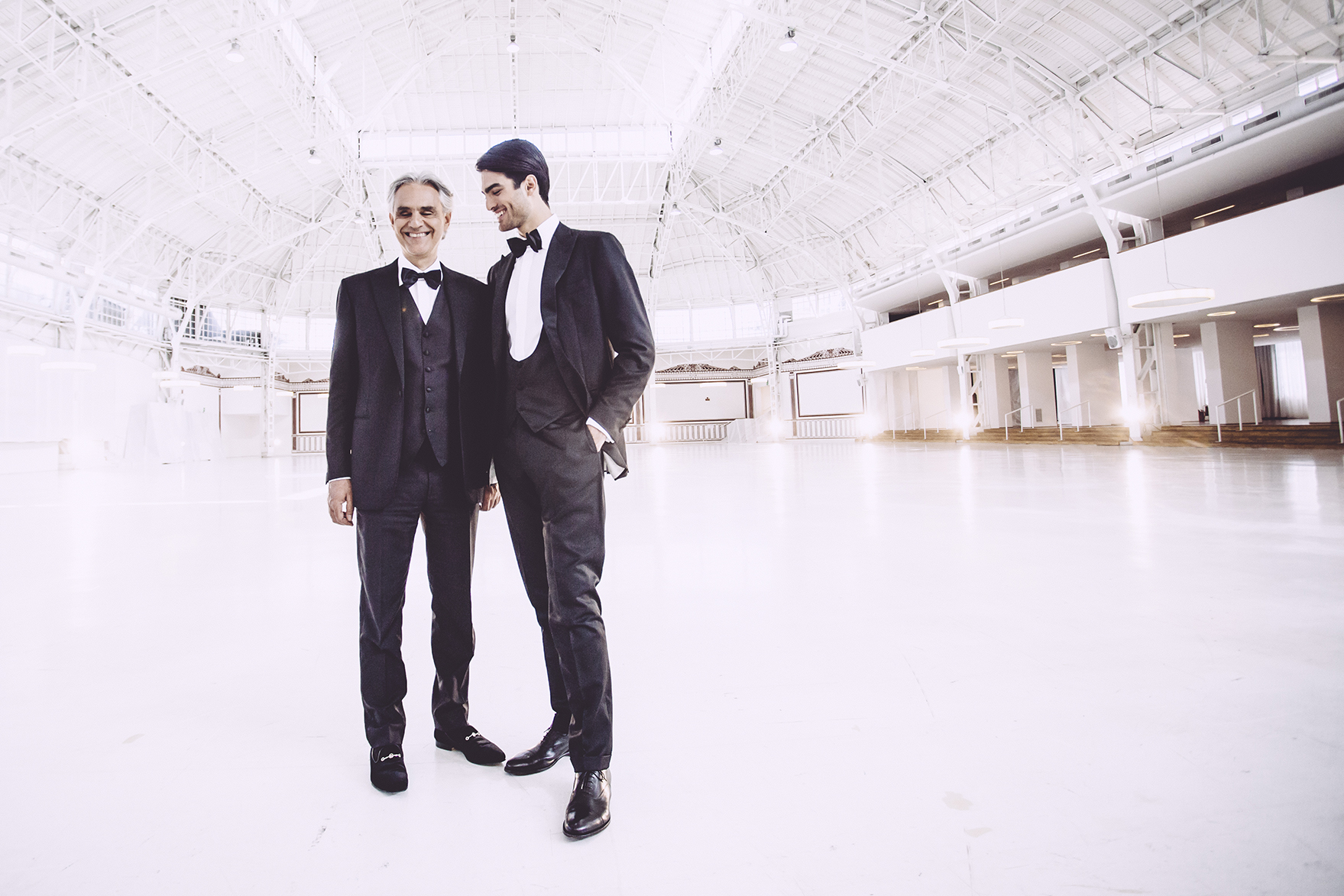
THE
EARLY
YEARS
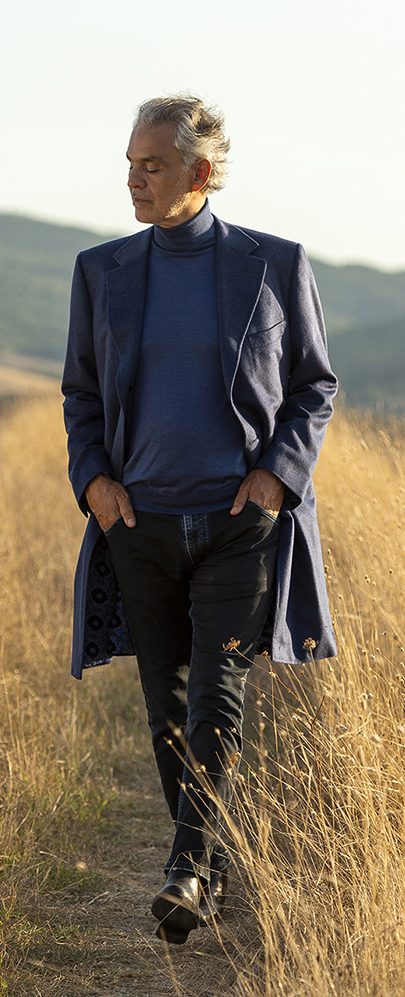
Maestro, how would you describe your childhood in Lajatico?
I would describe it as a happy, stimulating and very active childhood. In close contact with nature, I grew up in the countryside; I had two parents who loved me very much, handing me that hierarchy of values on which I then based my adult life.
You lived a childhood very close to the earth in the open Tuscan air. How did music come calling for you?
My parents had not had the opportunity to cultivate opera or classical music because they worked a lot and did not have the material time to deepen their knowledge of those repertoires. But I had a music addict uncle, and I was already passionate about opera at the age of six or seven. I consumed the micro-grooves that as if by magic, from the turntable in the living room, filled the house with the great operatic arias, and before long, I was able to recognize all the greatest voices of all time.
By nature, and by birth, you had a natural gift. Did you ever imagine, as a young boy, while studying singing and playing piano, that you could make music your career?
For a country boy like me, making music a profession without any connection in the entertainment world was a daring challenge with an uncertain outcome. This is also why my father insisted that I undertake university studies at the same time. However, I never abandoned the dream of living and supporting my family through music, even during my law studies, even when I performed in piano bars to pay for singing lessons.
What expectations did you have, or did you?
Up to the age of thirty-five, making a career of music was a chimera for me, a mirage—something glimpsed but never achieved. In the end, reality surpassed all my dreams, even the most daring. I remember, for example, my debut on the opera stage in “Macbeth”. It was 1994, and I was making a dream come true that I had been cherishing for years. But what I considered a point of arrival was vice versa the point of departure.
Ancient Greeks saw music as a gift of the gods and they believed music could have a positive effect on both body and mind of the listener. What is music according to Andrea Bocelli?
Music is a friend that accompanies you for life. All art is a gift from Heaven designed to express the spirit and, therefore to propagate good. Music has always been my dominant passion, and it has always been a medicine, a way to give lightness to life.
How important was it for you then, and how important is singing and instrument instruction for a young talent who wants to pursue a career in music?
I was self-taught as a child. I learned to play many instruments out of curiosity and the fun of making music. I loved that the language of music seemed to be much more powerful than the verbal one because it is universal and able to open the heart and the mind. But it is only many years later, in late adolescence, that I began to study piano seriously. To the young person who wants to be a musician, I would remind you that, in addition to talent (and that cannot be acquired), it also takes will, humility, a spirit of sacrifice, stubbornness, curiosity, determination in addition to a hint of narcissism.
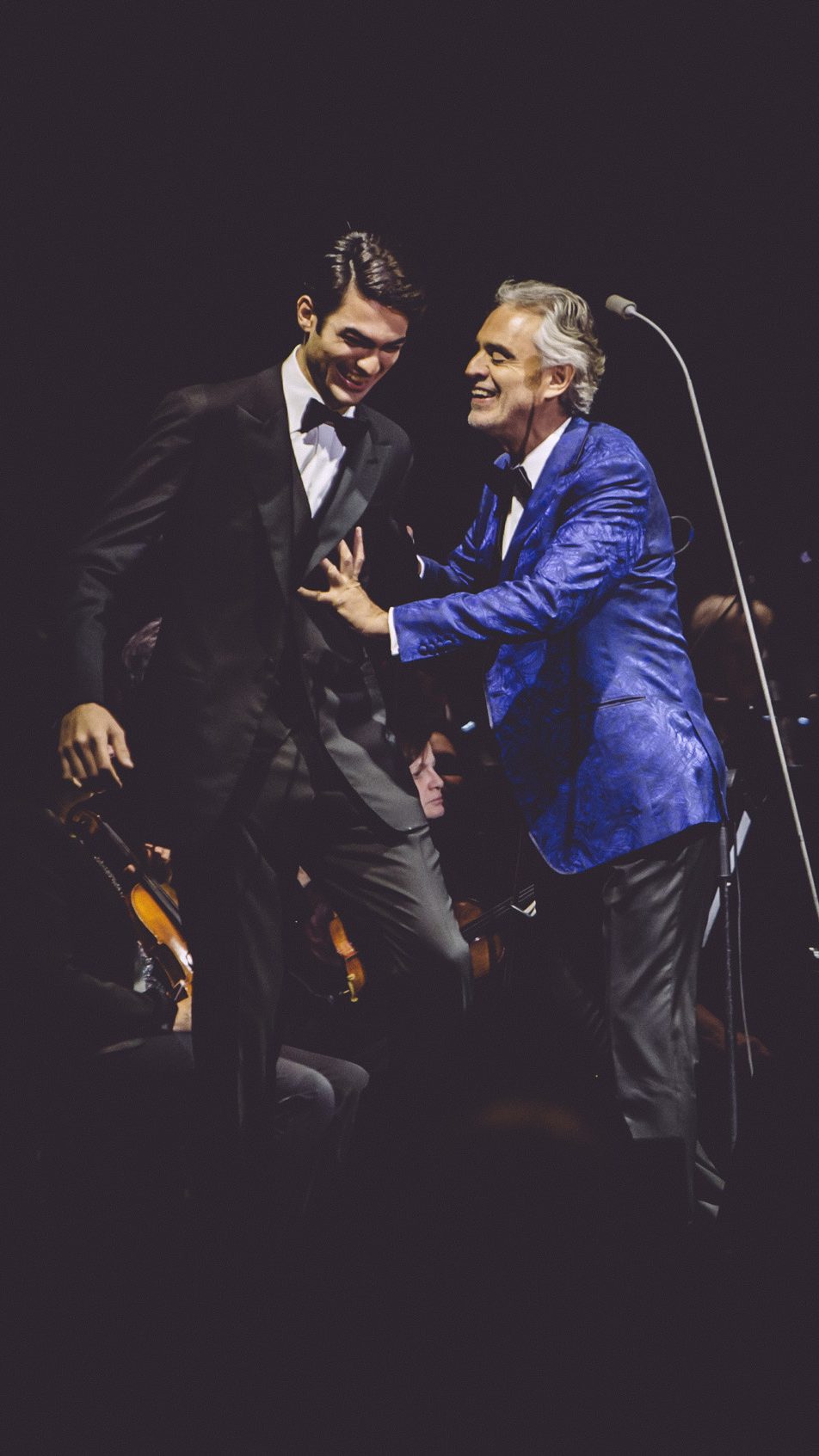
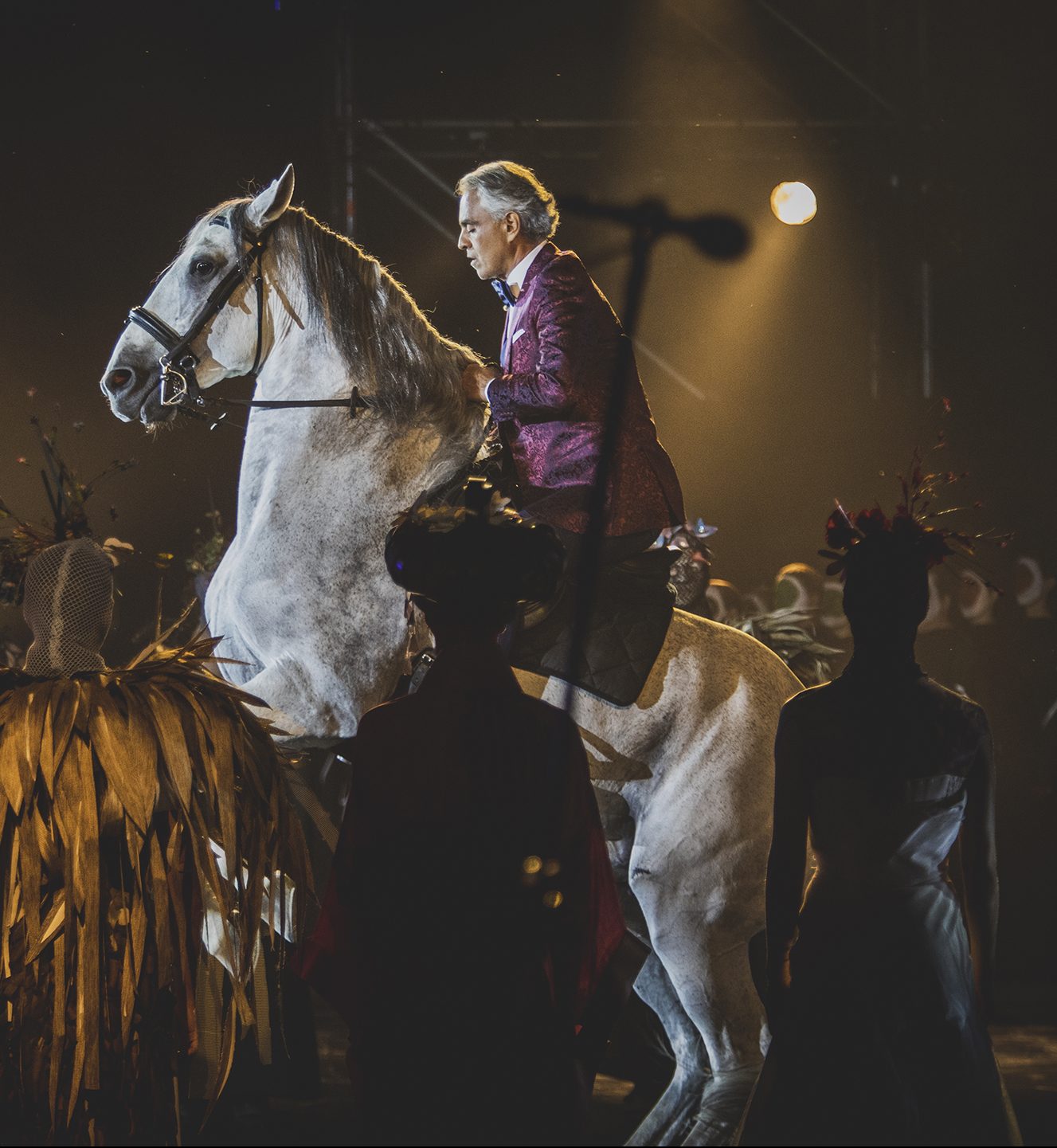
THE
RISE TO
STARDOM
You are one of the few singers (perhaps the only one) who manages to dominate three distinct worlds (pop, opera, and classical) and switch from one to the other with extreme ease, sometimes even within the same song (Con Te Partirò is perhaps the most representative song of this stylistic union). Do you think this versatility has been decisive for your career?
At that time, the hopes of making singing my profession had faded. Having collected many closed doors and a sturdy apprenticeship also made up of many setbacks and things “gone wrong,” which pushed the beginning of my career further and further away. I was undoubtedly agitated because I understood, at least in part, the importance of that audition in the presence of Zucchero. I was no longer twenty, but it is true that fate crossed our lives when he was already a famous artist in the world, and I was an unknown tenor and piano bar pianist. Everything starts from those lyrical inserts of “Miserere.” Everything starts from that song, so original, to the point that it resembled no other.
Miserere
Have mercy (Miserere)
Have mercy, have mercy
have mercy, dear me,
but I make a toast to life!
What a mistery is my life,
what a mistery,
I am a sinner in the year of 80000,
a liar!
Where am I? What do I do?
How do I live?
I live in the soul of the world
lost in the depths of life!
Have mercy, dear me,
but I make a toast to life!
I am the saint who betrayed you
when you were alone
and I live somewhere else, observing the world
from the heavens
and I see the sea and the forests,
I see myself…
…living in the soul of the world,
lost in the depths of life!
Have mercy, dear me,
but I make a toast to life.
If there’s a night dark enough
to hide me, to hide me,
if there’s a light, a hope
– magnificent sun shining inside me –
give me the joy of life
that’s not here yet.
Have mercy, have mercy!
That joy of life that perhaps
is not here yet.
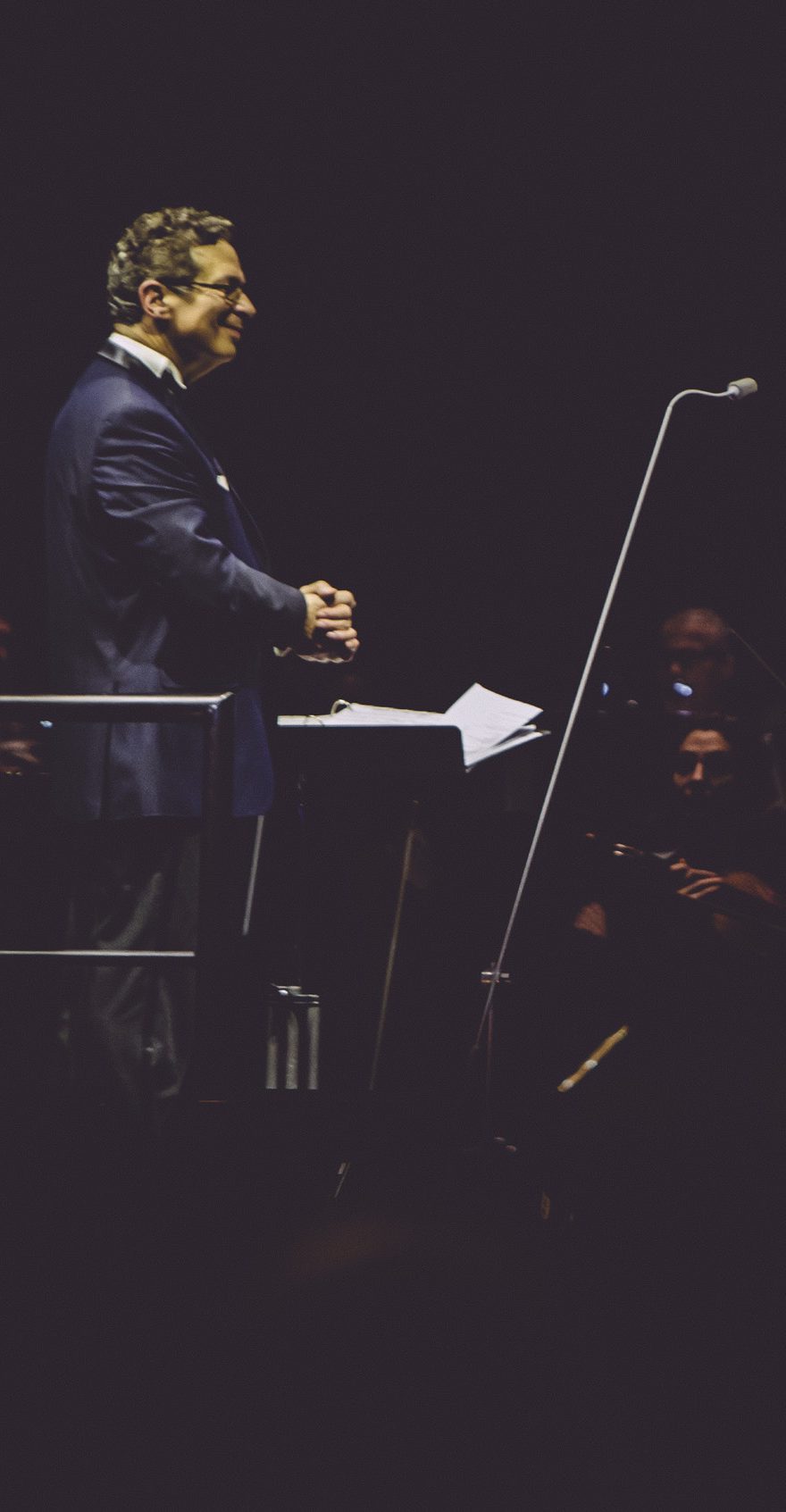
The versatility that fortunately characterizes my vocal instrument in the lyric field allows me to face the Belcanto and a more pushed repertoire, up to the Verismo. From the point of view of the vocal technique used, the differences between lyrical and “light” settings are less than they might seem. The fact remains that lyric and pop are different universes, each with its own difficulties. Intellectual curiosity is a figure of my career, my bet – that of attending both genres – is anything but original, it is the same pursued by artists such as Enrico Caruso, Beniamino Gigli, Tito Schipa, Franco Corelli: opera singers who also interpreted many popular romances, many songs. The real challenge continues to be that of advocating and disseminating quality wherever it is found.
It seems that initially when the hero of the story of life does good and things go wrong, they are actually on the right course—the key seems to be perseverance. Andrea, you continued to play in Piano Bars, even when it didn’t look like a sustainable career choice until your stamina and humility were rewarded, and you were discovered by Italian singersongwriter and musician Zucchero “Sugar” Fornaciari. This is not a common experience for an artist at the beginning. At this point, you were still a hidden gem. How did you manage all the emotions that go from being hidden to being an icon?
They say that you started singing your part in Miserere after almost the very first listening and that on the other side of the glass, Zucchero and his team were almost in tears, overcome with emotion. What was your perception in those moments?
We were at the “Umbi-Maison Blanche” studio in Modena in the countryside surrounding Modena. I went through the audition without any particular expectations. Indeed, along the way back, in a car with my mother and my friend and collaborator Pierpaolo Guerrini, I expressed my bitter opinion: “In my opinion, we have come to waste time.” Just before singing, while the technicians were preparing the studio, I remember that I went out and ran four laps of the block to activate the body. A few seconds later, I was in front of the microphone. In the control room was Zucchero, a guitarist from his band and my friend. Who then told me that at each passage of the lyric refrain, the famous bluesman crossed his gaze and shared the listening with colourful exclamations, all in a positive sense.
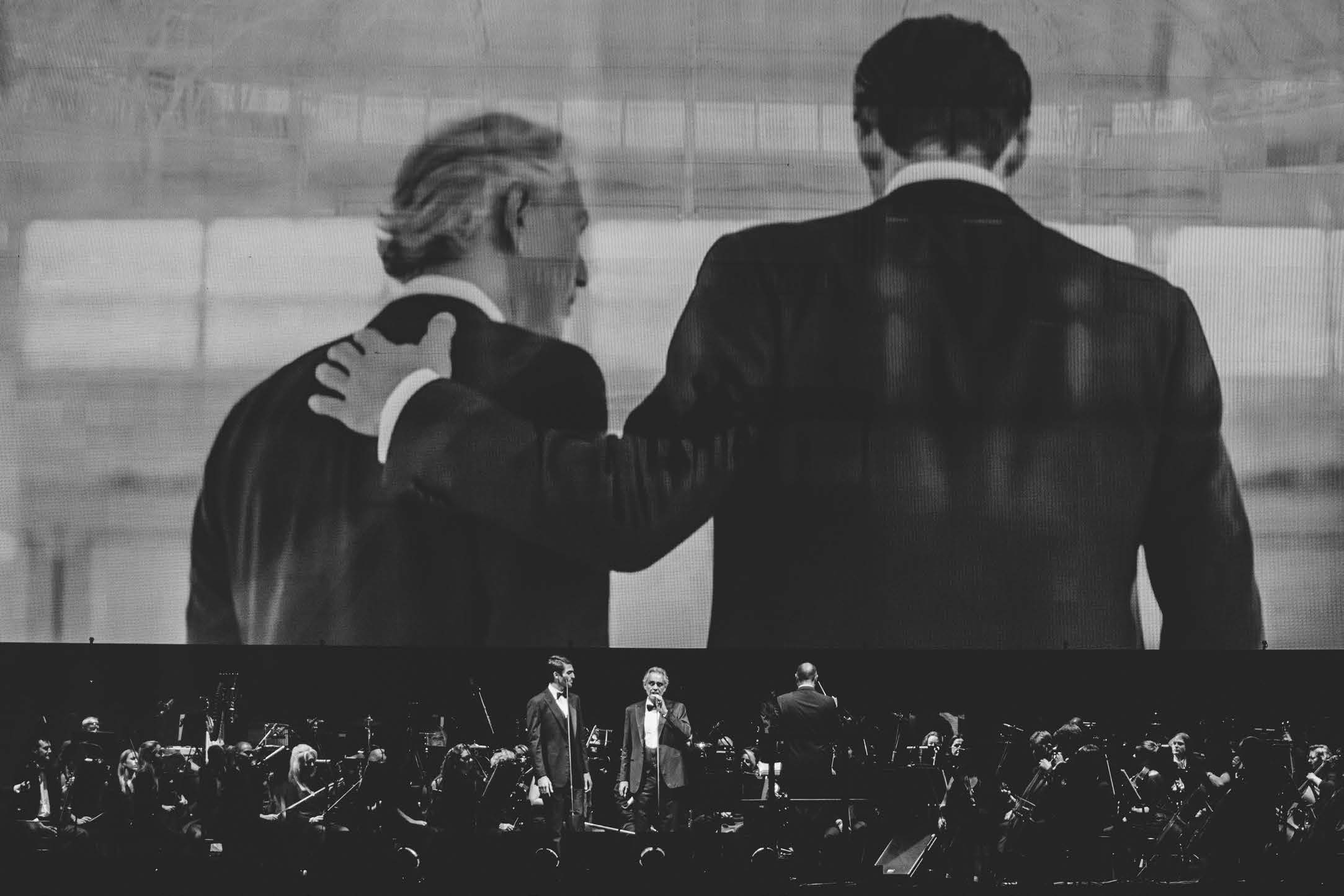
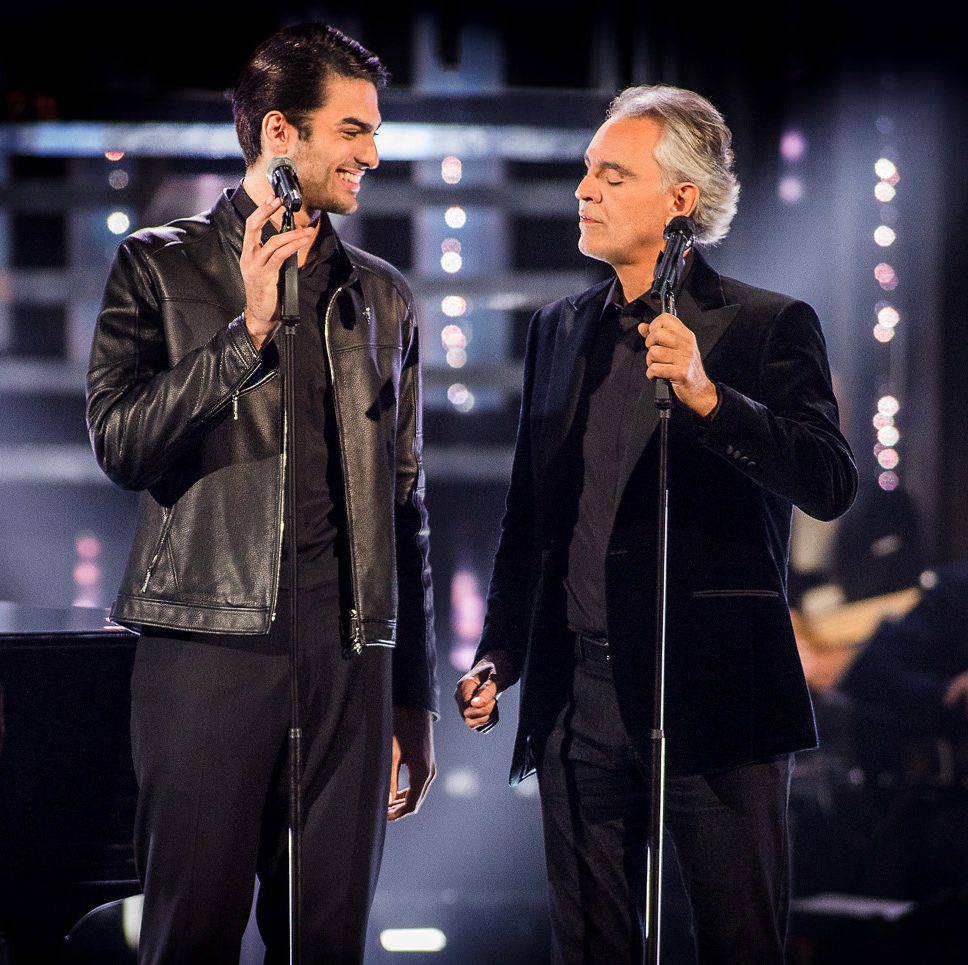
It’s already amazing to imagine recording an unreleased song for Zucchero, but then to discover that the recording would be listened to by Maestro Pavarotti – what was going through your mind at that moment?
I knew that Zucchero was looking for a new voice to record the demo of his new song, which he would later interpret with Pavarotti. In fact, the great Luciano listened to the recording and had generous words towards me. And my career probably started at that time. However, at the time of the audition, I was quite disenchanted. By now, I thought I knew that world sufficiently and – probably to avoid yet another disappointment – I didn’t give too much weight to generic promises.
After the audition, did you get the feeling that something great and exciting was going to happen shortly after in his career?
No, at least not immediately. I began to understand that there was hope when Zucchero’s tour from abroad landed in Italy, and I was called to sing live, starting with a concert in Bassano del Grappa. The audience cheered me like a real star! After the show, at the restaurant, I was asked to sing “Nessun Dorma”: Zucchero was impressed and decided that the piece would be included within the concert from the next day. From that day on, every time, the aria was accompanied by great ovations.
From that moment on, a series of events took place, the official recording of the duet with Zucchero (you instead of Pavarotti), the European tour with Zucchero, the victory in Sanremo ‘94, etc. … Do you remember the moment when you realized you were not only popular but that you had entered the hearts of the people?
I met my first great success with Sanremo. The day before, I was nobody. The next day I was a star. When I returned to Lajatico, the villagers had organized a procession, and I could not understand that they treated me differently than usual. I felt like saying: “Oh guys, it’s me, Andrea!”
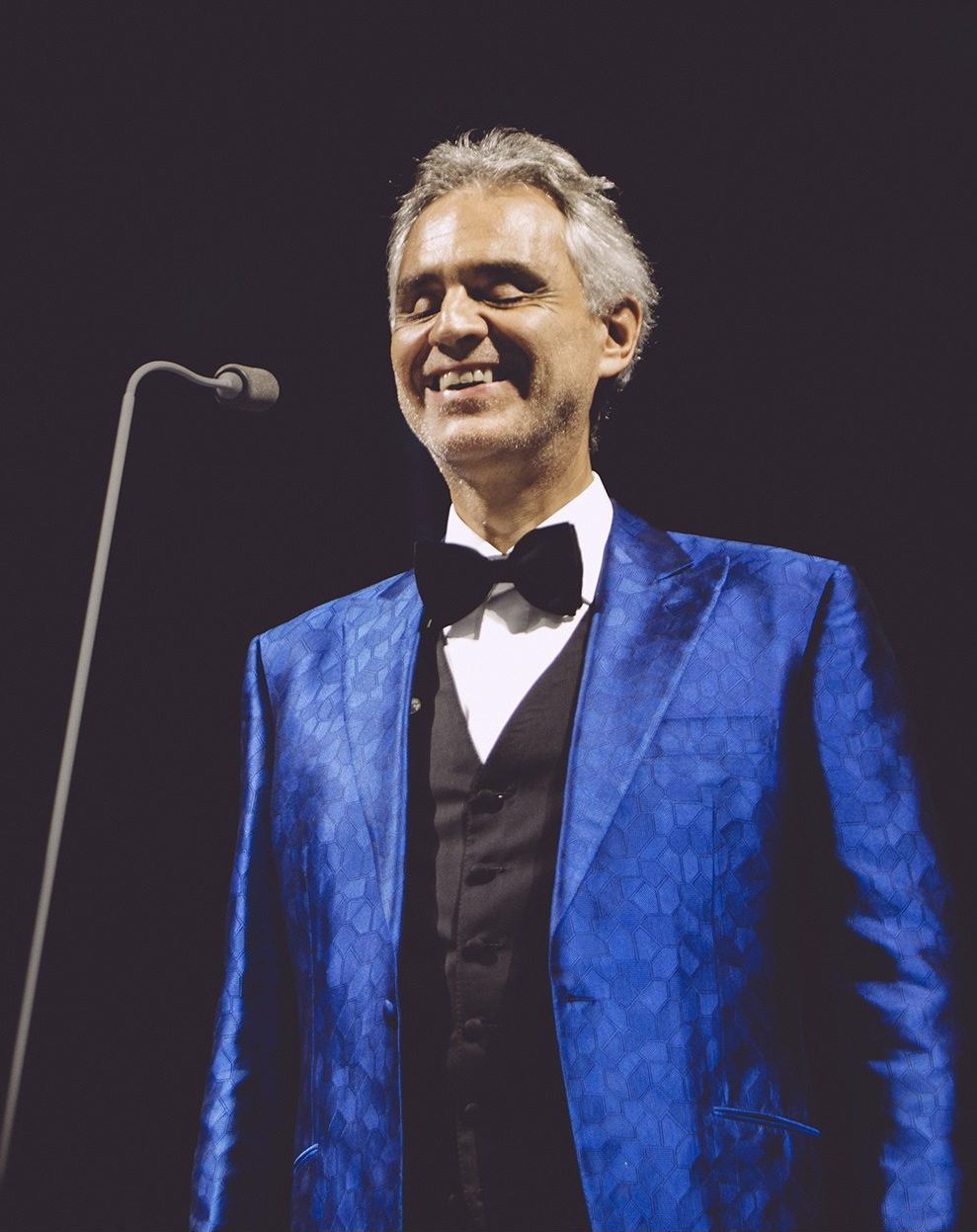
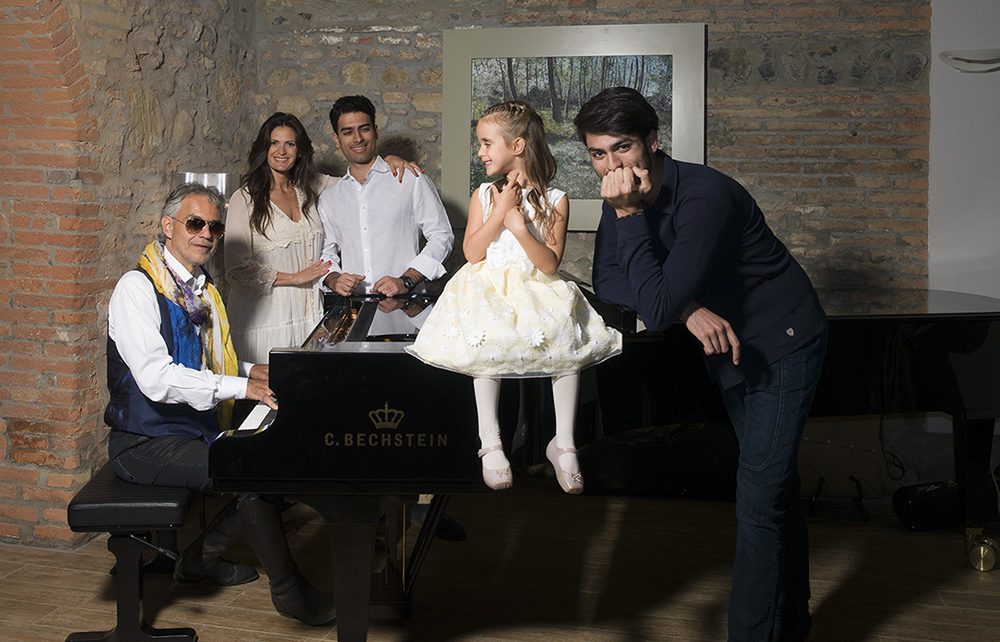
In the 2001 documentary, ‘Cieli di Toscana,’ we see your sons Amos and Matteo. What I found fascinating was Matteo’s love for music as a child, bringing you his guitar and singing a nursery rhyme with you with a lot of passion. Now, 20 years and 91 million views later, you perform ‘Fall on me’ in a spellbinding duet with Matteo. How does it feel to see your child following in your footsteps?
FAMILY
I wasn’t the one who encouraged him. On the contrary, I warned him from the beginning of difficulties that I know well, making him aware of how complex the show business environment is. But it was his choice, taken in total autonomy. And I’m happy because I realize today that Matteo, in music, has found his own way and his own style, expressing his personality. That my son loved music and singing, in particular, was evident ever since he was a child. To sing in front of me, however, he seemed to be ashamed. He preferred to duet on my records in my absence. Then luckily, he broke all delay and decided to tackle the study of singing. Having Matteo at my side, on some tours, sharing the stage with him, was for me a great and unexpected gift of life. His first single, “Solo,” seems very promising to me. Besides, it is a song that fits perfectly with his vocality.
FAITH
2020, nearing the end of annus horribilis, Andrea released the album ‘Believe,’ a highly-spiritual and hope-inducing record containing many Sacred and Christian music classics, as he had already done with the release of his classical album, ‘Sacred Arias’—an album that captured a listing in the Guinness Book of World Records for simultaneously and unprecedentedly holding the top three positions on the US classical album charts.
Andrea, given the importance and strong presence of religiously inspired music as part of your repertoire, what significance has faith had on your personal life and artistic expression?
Faith is the center of gravity of my life and affects the private and the professional dimension. I came to faith after a long journey, already in adulthood: I consider it a priceless gift that I try to keep and increase. Singing and music, in general, can be an instrument of faith, as can any fruit of human ingenuity. The concept of “Believe” revolves around three fundamental concepts, the first of which is faith. Together with hope and charity, which constitutes the theological virtues: the foundations of Christian action and three universal ethical principles. Interconnected words, because without charity, there can be no faith or even hope. The album “Believe” expresses the need to suggest a path that brings together pages capable of speaking to the soul, giving the listener an incentive to meet their own inner dimension and listen to its reasons.
Virginia loves music. She likes to sing and studies piano (as well as dance), but from here, to make it a profession, there is space for many variables because she is still a child. At the moment, it is little more than a game for her, as it should be. Studying music is always useful. It strengthens and makes people better. The art of sounds is a friend that accompanies you throughout your life. It is a tool to make every soul fruitful. I encouraged my children to study and attend it, but not to make it a profession. I believe it is essential that children fulfill their aspirations, putting their talents to good use, regardless of parental ambitions.
Veronica: Inside the ‘Believe’ album, there is a beautiful version of Cohen’s Hallelujah, which is interpreted in a duet by Maestro Bocelli together with your daughter Virginia. How do you feel to see that even your daughter, so talented, is already entering the international music scene?
THE
JOURNEY
Can you tell us about the documentary “The Journey,” the Via Francigena, travelled by you and Veronica on horseback from Rome to Lajatico, “the purpose” and your experience?
It is an ambitious project, even more so because I am no longer a boy! I rode for hundreds of kilometres, together with Veronica, making a pilgrimage along the Via Francigena. A journey that we have conceived as a form of prayer, as a testimony – expressed through discipline and even physical fatigue – on the need to return to the essential values of life.
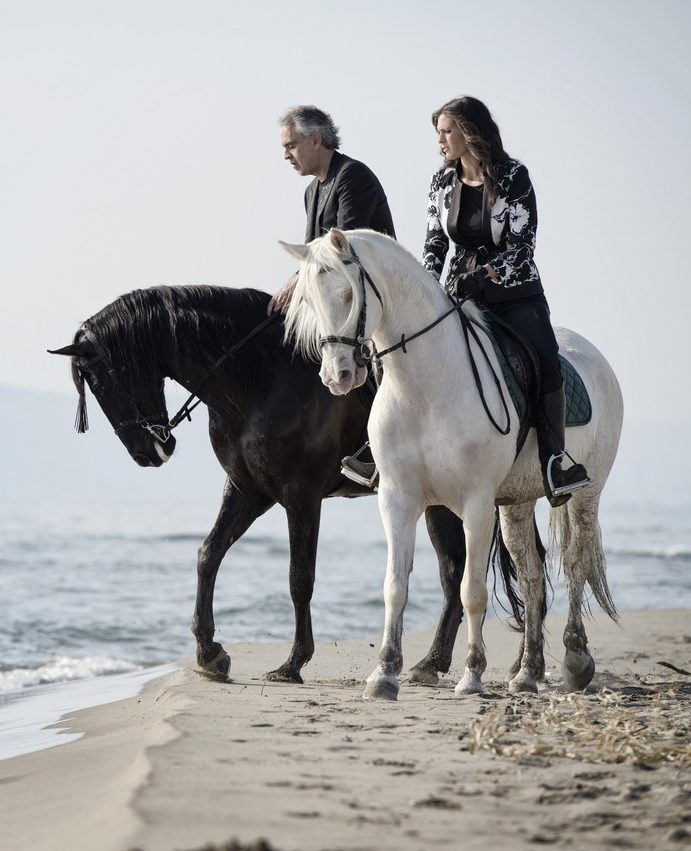
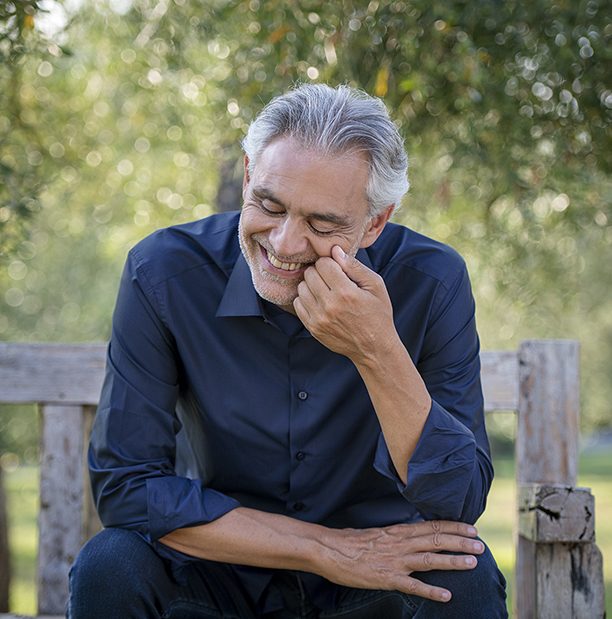
We started from the heart of Christianity, from the tomb of St. Peter in Rome, to reach the Tuscan hills where my family has lived for many generations, and where I was born and trained. This was an idea that I had been harbouring for some time, and it was an intense, complex but full of beautiful surprises experience, which has also become a documentary. I wanted to conceive this pilgrimage on two key themes: the first is the homage to places of worship, and therefore to sanctuaries and monasteries, catalysts of positive energy, where good has taken root, through centuries of prayer. The second is that of music and is related to the previous one precisely because music can be prayer.
From the point of view of faith, it was compelling to see the Catholic and Protestant faiths unite through God and music. How did you feel being in this different environment of faith among the majority of Protestant Christians: and what similarities at the level of faith do we share?
Religions are all shortcuts to getting to Heaven. The problem is that the hand of man, over time, has partially polluted some of them. But to clean up and rediscover its essence, each of us can question our own conscience. As for the ritual differences, I think our Lord takes little interest. Like a father who has many children: each has their own character, but all are equally loved by him.
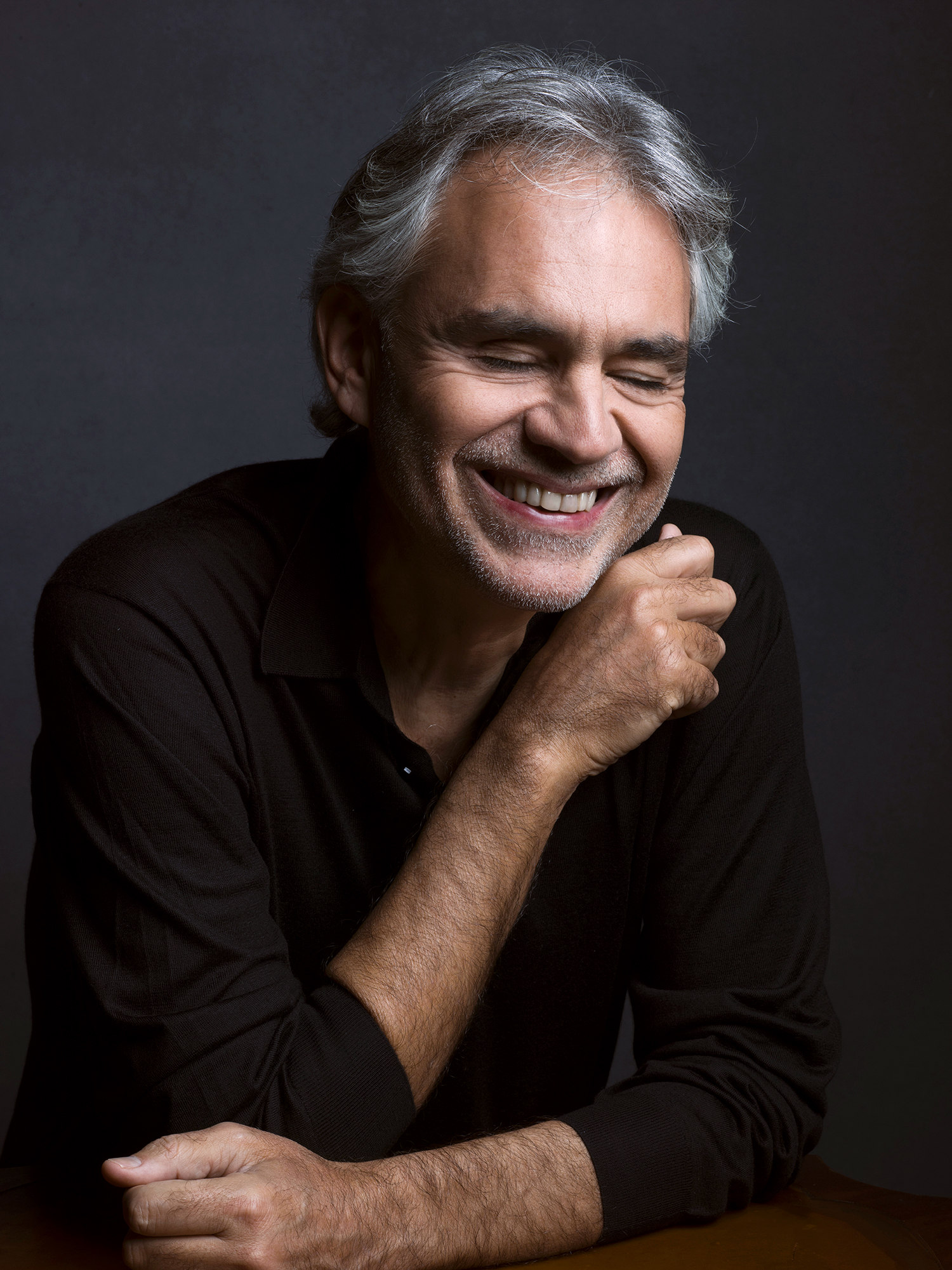
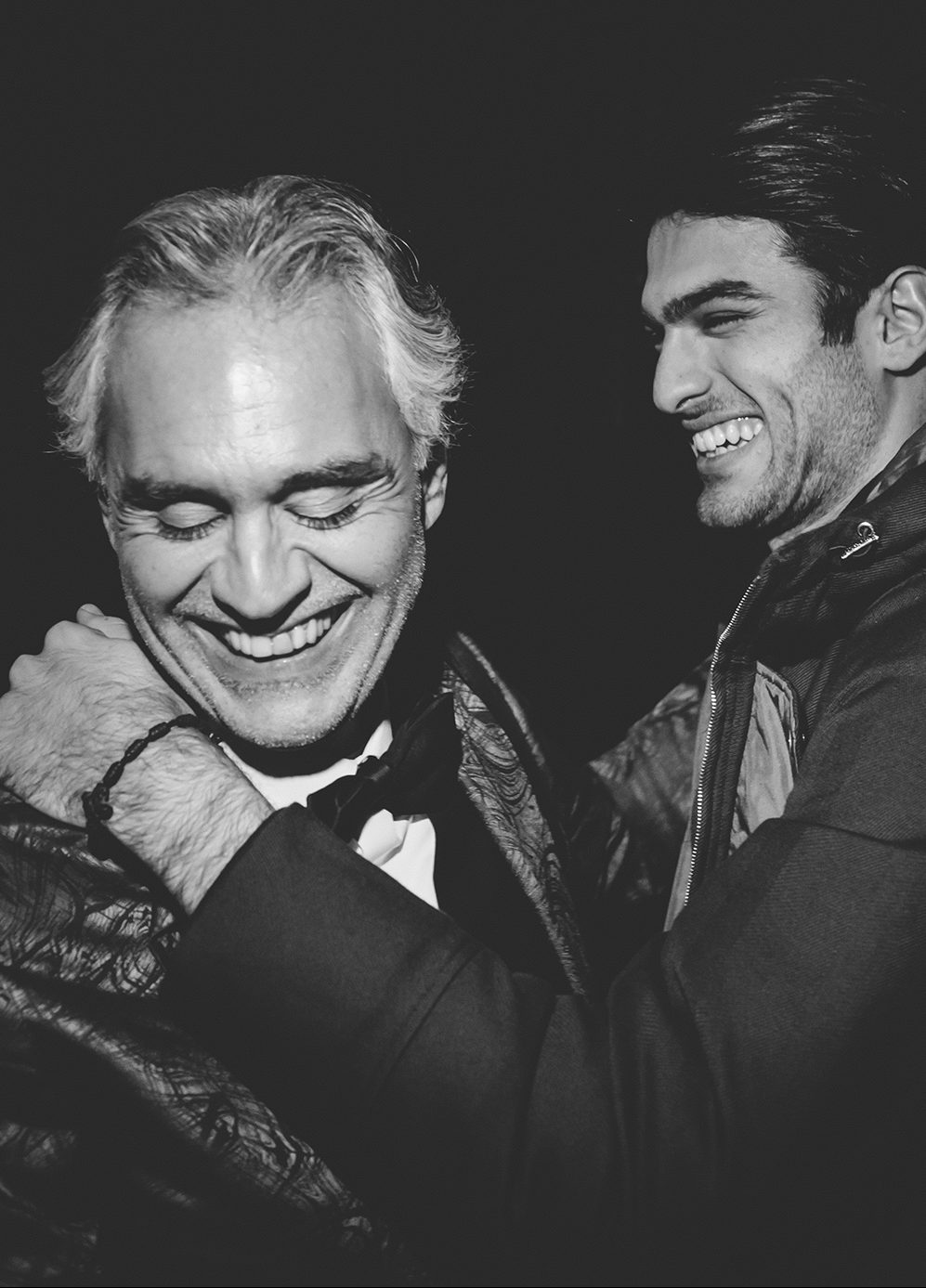
Recently, Lakewood Church in Houston Texas organized AMAZING GRACE, a night of music and solidarity to encourage people and communities, supporting the Andrea Bocelli Foundation and presenting a glimpse into your new documentary, The Journey. Can you already tell us when and where it will be distributed?
Frankly, I’m not the best interlocutor for this type of information, for the simple fact that I’m often not aware of it. But I can anticipate what I hope. And that is, that this project can induce people who have not yet experienced a pilgrimage to reflect and find the reasons for doing so, each with their own path and with their most suitable means. I believe it is an experience that can make us better. Above all, it can make us more aware of the fact that it is all of life that is sacred, that is a miracle.
